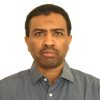Ibrahim Mohammed
Adjunct Faculty
Dr. Ibrahim Mohammed is a research scientist in the Hydrological Sciences Laboratory at Goddard Space Flight Center, National Aeronautics and Space Administration. Dr. Mohammed joined the Experimental Program for Stimulating Competitive Research program at the University of Vermont as a Post-doctoral Associate after obtaining his Doctorate degree. Dr. Mohammed received MS and PhD degrees in Civil and Environmental Engineering from Utah State University. He received his BS Honors from University of Khartoum, Sudan.
Dr. Mohammed’s research interests span physical and statistical hydrological modeling and their relationship with climate, land cover, as well as integrating and synthesizing water related science and engineering research activities to meet the growing demands for integrated professional data analyses. In addition, his research is engaged with the development of web-based decision support system tools to facilitate satellite earth observation data access. Implication assessments associated with future climatic changes on streamflow regime and how it relates to reservoir management, quantifying the general sensitivity of water availability and its linkage to ecology at the scale of regional sub-basins to changes in land use/land cover, climate and watershed management are just few examples from Dr. Mohammed’s research portfolio. Dr. Mohammed has explored the role of bathymetry in the dynamics of a closed basin lake system and showed that some of the preferred system states are directly attributable to features of the bathymetry using the topographic area-volume relationship. He has also quantified closed basin lake system volume change sensitivities to variables and factors that are related to the system dynamics. In that regard, Mohammed has developed a mass balance model to generate representative realizations of future Great Salt Lake level from climate and streamflow inputs simulated using statistical methods. Studying human and natural systems interaction with their associated impacts on water production and the biodiversity of freshwater ecosystems meet Dr. Mohammed’s research goals.
